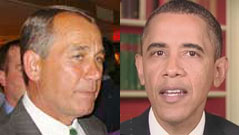 |
msnbc.com...
Obama faces new
obstacles in high-stakes debt talks
Failure to act may mean first-ever default on nation’s financial
obligations, which some warn could trigger global financial chaos
WASHINGTON — President Barack Obama will try to salvage high-stakes
debt talks on Sunday after Republicans pulled back from a joint effort
to craft a broad $4 trillion deficit-reduction deal as part of a plan
to avoid a government default.
On the eve of bipartisan negotiations hosted by Obama, House of
Representatives Speaker John Boehner — facing stiff opposition from
fellow Republicans over the prospects of higher taxes as part of a
large-scale deal — told the president he would only pursue a smaller,
$2 trillion package .
A deficit reduction agreement is crucial to winning Republican support
for an increase in the nation’s debt ceiling. The government’s
borrowing capacity is currently capped at $14.3 trillion and
administration officials say the United States will go into default
without action by Aug. 2.
Expectations for Sunday’s meeting took an abrupt turn Saturday after
Boehner informed Obama that the smaller package identified — but not
agreed to — by bipartisan negotiators was more realistic.
“Despite good-faith efforts to find common ground, the White House will
not pursue a bigger debt reduction agreement without tax hikes,”
Boehner said in a statement. “I believe the best approach may be to
focus on producing a smaller measure.”
Boehner’s decision threatened to thrust Sunday’s White House meeting
between Obama and congressional leaders into disarray.
Failure to act could mean the first-ever default on the nation’s
financial obligations, which the White House and private economists
warn could push the United States back into recession and trigger
global financial chaos.
Aides to Obama and Boehner had been working on a far-reaching package
of spending cuts and new revenue that would have reduced deficits by $4
trillion over 10 years and cleared the way for lifting the cap on the
government’s borrowing capacity.
But Boehner’s move dampened hopes of any immediate compromise and
raised doubts about the chances that Sunday’s talks would start moving
the budget debate toward an endgame.
Big differences remain
Boehner and Obama, whose 2012 re-election prospects are tightly linked
to U.S. economic and fiscal health, spoke by phone on Saturday and
failed to resolve key differences over taxes and entitlement spending.
But after Boehner’s announcement, the White House said Obama would not
“back off” his efforts toward a comprehensive deal and suggested he
might try to change the Republican’s mind. Sunday’s session is set for
6 p.m. EDT.
“Both parties have made real progress thus far,” White House
communications director Dan Pfeiffer said. “Tomorrow, he will make the
case to congressional leaders that we must ... take on this critical
challenge.”
Obama had summoned congressional leaders to lay out their “bottom-line”
demands for what the White House has billed as vital phase in the quest
for a sweeping budget agreement.
There had been growing pressure from rank-and-file lawmakers who must
approve anything hammered out in closed-door White House talks. Critics
on the left and the right had voiced unease at some options on the
table, and they are now expected to dig in their heels even further.
The biggest obstacles to an agreement remain.
Democrats want to shield popular domestic programs from huge cuts and
say that any deal must include increases in tax revenue, including an
expiration of Bush-era tax cuts on wealthier Americans.
Republicans — under pressure from Tea Party conservatives — reject any
increased taxes and want curbs on popular benefit programs such as
Medicare, Medicaid and Social Security.
The stakes are high for Obama. His 2012 re-election hopes hinge not
only on reducing America’s 9.2 percent unemployment but on his appeal
to independent voters who want tougher action to get the country’s
fiscal house in order.
But Boehner and other mainstream Republicans do not want to be blamed
for the economic turmoil that could be unleashed by any government
default on its debt.
For his part, Obama is risking a mutiny on the left flank of his party
for even agreeing to discuss entitlement programs traditionally
protected by Democrats and which many feared would have been curbed
under a $4 trillion plan.
Aides to Obama and Boehner were also discussing revenue increases that
would have been achieved in part by a streamlining of the tax code,
something that appeals to both Democrats and Republicans.
But Democrats’ demands for $1 trillion in additional revenue also
include eliminating tax breaks and other measures that many Republicans
were reluctant to support.
Leana Fallon, an aide to House Republican Leader Eric Cantor, urged
that the talks focus on a framework for between $2 and $2.5 trillion in
cuts discussed in meetings led by Vice President Joseph Biden in May
and June that ended in impasse.
Democratic Representative Chris Van Hollen blamed the abandonment of a
bigger deficit-reduction goal on a “Republican fixation with protecting
tax breaks for corporate special interests and the very wealthy.”
Republicans want an agreement for at least $2 trillion in cuts as the
price for a debt limit increase big enough to accommodate borrowing
needs through the 2012 election.
Obama spent Saturday at the Camp David presidential retreat in Maryland
and was due to return for the rare Sunday talks, his second session
with bipartisan leaders in four days.
Reuters and The
Associated Press contributed to this report.
Read this and related stories at msnbc.com
|

